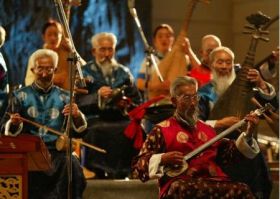Difference between revisions of "Ancient Naxi Music"
imported>Ciic |
imported>Ciic |
||
| Line 1: | Line 1: | ||
| − | [[File:Naxi ancient music performance at Lijiang.jpg|thumb|Naxi ancient music performance at Lijiang]] | + | [[File:Naxi ancient music performance at Lijiang.jpg|thumb|280px|Naxi ancient music performance at Lijiang]] |
| − | '''Ancient Naxi music''' is also known as the Music of Daoist Classics, a precious piece of cultural heritage. | + | '''Ancient Naxi music''' ('''纳西古乐''') is also known as the Music of Daoist Classics, a precious piece of cultural heritage. |
[[Lijiang]] of [[Yunnan]], boasts a Naxi music orchestra, most of its members being in their senior years. When performing, the players dress in gorgeous traditional robes, and play various kinds of stringed instruments in a relaxed manner. Standing out from the older musicians is a young Naxi girl playing the [[zheng]], the Chinese zither. The most intriguing item on the stage is a red-lacquer stand from which hang ten small gongs. These are played by an elderly gentleman with a long silver beard, who, at 86, is the oldest member of the team. | [[Lijiang]] of [[Yunnan]], boasts a Naxi music orchestra, most of its members being in their senior years. When performing, the players dress in gorgeous traditional robes, and play various kinds of stringed instruments in a relaxed manner. Standing out from the older musicians is a young Naxi girl playing the [[zheng]], the Chinese zither. The most intriguing item on the stage is a red-lacquer stand from which hang ten small gongs. These are played by an elderly gentleman with a long silver beard, who, at 86, is the oldest member of the team. | ||
Latest revision as of 10:34, 13 November 2015
Ancient Naxi music (纳西古乐) is also known as the Music of Daoist Classics, a precious piece of cultural heritage.
Lijiang of Yunnan, boasts a Naxi music orchestra, most of its members being in their senior years. When performing, the players dress in gorgeous traditional robes, and play various kinds of stringed instruments in a relaxed manner. Standing out from the older musicians is a young Naxi girl playing the zheng, the Chinese zither. The most intriguing item on the stage is a red-lacquer stand from which hang ten small gongs. These are played by an elderly gentleman with a long silver beard, who, at 86, is the oldest member of the team.
The orchestra performs in a courtyard similar to those of Beijing, their repertoire covering both classical and folk pieces. The sweet old melodies are accompanied by soft singing, bringing peace and comfort to an audience fatigued by the worries and urgencies of urban life.
Ancient Naxi music has won a worldwide reputation. An article in The Times of London wrote that the most wonderful part of a China trip was listening to ancient Naxi music in Lijiang, the most authentic and serious Chinese music. The Japan Times also ran a long report on the Naxi ethnic group in Yunnan and their music. In 1995, Naxi musicians were invited by the Arts Council of Great Britain for a two-week visit, performing at the University of Oxford, the Royal Academy of Music and other places in the UK. In the following years they made more trips abroad as a non-governmental art organization introducing their ethnic culture to the world.
